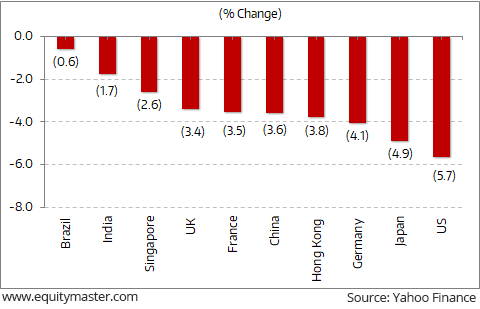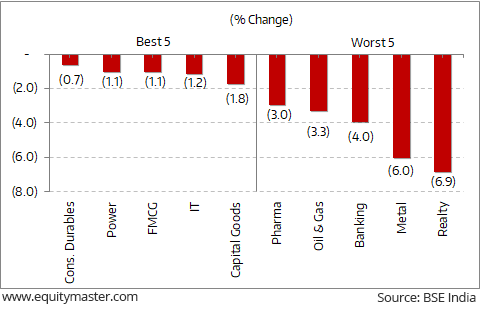Global financial markets turned negative on fears about a global trade war, with Trump going on the offensive on Chinese goods. President Donald Trump announced on Thursday that he would impose tariffs worth US$ 50 billion on Chinese goods. The US markets were down by 5.7% for the week.
The Chinese government also retaliated with its own plans to import taxes on US products worth US$ 3 billion. China plans to add 15% tariffs on US steel pipes, pork, fruit wine and other products. The Chinese index was down 3.6% in the week gone by.
Other Asian markets also traded lower on the back of rising uncertainty amongst the world’s two largest economies. Japan’s CPI data came in at 1% in February, far away from its target of 2%. Japanese markets were down by 4.9% for the week.
Key World Markets During the Week

Back home, Indian share market also ended the week lower amidst the trade war fears. The Indian PSU economy has been reeling on the back of the PSU banking scam that broke out in the previous month. The decline was further exaggerated due to selling by Foreign Institutional Investors (FII). The Indian stock market ended the week lower by 1.7%.
On the sectoral indices front, Realty and metal stocks were the major losers during the week.
BSE Indices During the Week

Now let us discuss some key economic and industry developments during the week gone by.
As per an article in a leading financial daily, the Reserve Bank of India’s (RBI) data on performance of the private corporate sector has showed that India’s manufacturing sector witnessed an improvement in sales growth in the period October-December 2017-18 (Q3) on annual basis.
However net profit has remained subdued due to lack of support from other/non-operating income. It noted that during Q3 of FY18, manufacturing companies’ sales surged by 14% as compared to the similar period of the previous fiscal period while net profit of these companies declined by 2.4%.
Further, the services (non-IT) sector showed signs of revival as reflected by positive sales growth. According to the data, the information technology (IT) sector also registered modest improvement in sales growth, although lower than in the previous year.
Besides, it pointed out that among major manufacturing industries, demand conditions improved for chemical and chemical products; cement and cement products; machinery and machine tools; and motor vehicles and other transport equipment.
The data further stated that operating profits of the manufacturing sector were supported by improved demand conditions and continued to record a healthy growth, despite significant increase in input costs.
It also said that pricing power in terms of the net profit margin declined for the manufacturing sector, while it improved for the services (non-IT) sector.













Leave A Comment